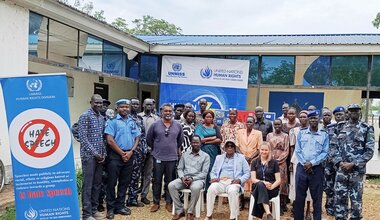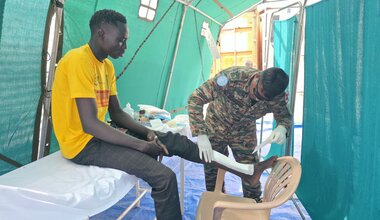Peacekeepers construct first secondary school block in Kuron peace village
Construction has begun on the first secondary school in the Kuron peace village in Kapoeta as part of a special project funded by the United Nations Mission in South Sudan to support the peace process.
“It is our hope that the construction of the two classrooms, one office block and one water and sanitation facility in Kuron will play a key role in ensuring that children have a right to education and that girls are especially encouraged to go school,” said Caroline Waudo, UNMISS Head of Field Office in Torit.
The school construction is part of a Quick Impact Project scheme operated by UNMISS to support communities and encourage peaceful coexistence. They cost under USD$50,000 and are rapidly implemented within a three-month time frame.
Kapoeta authorities, working in collaboration with religious and community leaders, say education is the responsibility of all stakeholders, so they will work together to improve learning in this very remote part of the country.
“As the state government of Kapoeta, we will equip the school with stationary and provide additional teachers to help the two teachers who are already here to boost learning in this area,” said Sam Felix Makuja, Kapoeta Minister of education.
The secondary school construction is one of 18 QIPs funded by the peacekeeping mission in Eastern Equatoria since 2012. Past projects have included the construction of water sanitation facilities, courthouses, medical centres, police posts, and water pipelines.
Kuron peace village was established by Bishop Emeritus of the Catholic Diocese of Torit, Paride Taban, more than 10 years ago to encourage local communities to live together as one people regardless of their ethnic origins.
It has fostered reconciliation and peace between the Jie, Murle and Toposa communities who previously clashed with each other over cattle-raiding and child abduction. The village is home to 400 primary-aged children from different ethnic communities.
“Now this place has become a peace place especially the Jie, the Murle and the Toposa, who call themselves “Nemoyi” at certain moments and “Lopayi” meaning a foreigner, now they instead call themselves friends,” said Bishop Paride Taban. “When there is hunger, the Jie people are going to exchange food with goats in Kapoeta and they live together as families.”
 UN
UN United Nations Peacekeeping
United Nations Peacekeeping





